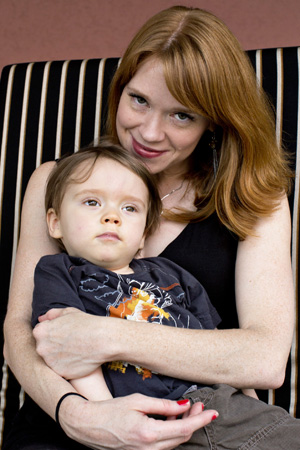This originally appeared on Role/Reboot. Republished here with permission.
I recently spent two days at Canyon Ranch in Lenox, Mass., a resort committed to healthy living. The staff and fitness instructors and demonstration chefs encourage all guests to believe in the power of possibility. In exchange for giving a reading and teaching two seminars, I was allowed to bring a friend for two days of fitness classes, massages, facials, and super healthy meals. I took my friend Weber, and when she and I checked in, the friendly lady asked us if we were “ready to make healthy choices.” We agreed that we were (especially after stopping at Dunkin’ Donuts on the freeway).
Canyon Ranch is a beautifully landscaped mansion converted into a hotel. In the Berkshires, fog hovers over the mountains in the morning, and at this time of year the leaves were beginning to change, and the green grass was so green as to be surreal. Walking out to the stone labyrinth in the morning (after my healthy breakfast of steel cut oatmeal and fresh squeezed orange juice) was like being in Narnia or the Shire, or any place where time stops for a bit and reality warps. Where is Ronan? I thought suddenly. When will I see him? It was so quiet and still, the air wet and foggy and, it seemed, freshly pressed from the sky, my footsteps the first in the grass that I half-expected to believe that it might happen. The air smelled like apples and damp leaves. I spent the rest of my day in a haze, still trapped in that morning fog long after the sun had burned it away.
It was difficult to avoid healthy choices at Canyon Ranch, just as it was difficult to avoid thinking about how much I miss my son. The quiet, clean hallways. The perfectly proportioned food (which made me realize how out of proportion my own meal sizes are. Yikes.), the possibility of taking a cycling class, a balance seminar, and a West African drumming class in one afternoon. We were up at 7 a.m. and in bed by 10 p.m., relaxed and smelling sweetly like the resort’s fancy lotion, peachy with a vanilla undertone.
Related
While I was relaxing (or trying to; I think it’s hard for most of us to do this), I realized how hard it has been for me to come down to earth, to any feeling of normalcy, after two and a half years of caring for Ronan, and waiting for the inevitable ending of his life. Sometimes, when I’m teaching or driving or drinking coffee or watching Law and Order, I’ll remember an image from Ronan’s final days. I don’t burst into tears anymore; I don’t feel manic or crazy or like acting out. I feel resolved, which is perhaps the more active cousin of numbness.
One of the women who attended my reading talked about her experiences counseling caregivers who had lost or were losing a loved one. She said that it was important for these individuals to feel as if they had “done everything,” because it was a way (she thought) of assuaging the survivor’s guilt that happens after a loved one has died.
I did not “do everything” to save Ronan. I did my best to give him a good life, but he had no Herculean efforts to maintain or prolong his life, which I felt would have been extending not his life as much as the duration of his suffering. No equation of healthy choices will make a dent in Tay-Sachs disease; no nutritional tweaks or lifestyle changes. It’s lethal, plain and simple.
I didn’t question my plan of care; I think “doing everything” is more about the person doing the everything, whatever that might entail, and less about the quality of life of the individual who is dying. And it was the first time since my son died when this thought—I miss my boy—didn’t make me feel wild with despair, or hot with anger, or just manic with helplessness.
Instead, this thought felt like a pocket of safety, much like Canyon Ranch is meant to be a pocket of healthy living, a safe place to sit down and recollect. I’ve come to realize that admitting my grief is never going away, that I’ll never “be over it,” as our culture likes to encourage us to do when it comes to grief, I can sit in that space of sadness without getting lost in it.
Whenever you are grieving, time will always stop. Reality will always be warped. What two days of careful, clean living and loads of elastic time taught me was that this ability to weather that new reality—of being warped, of being irrevocably changed—is everything you can do for yourself, and for the person you keep alive through remembrance.
I’ll never overcome my grief about losing Ronan, I will always miss him, I will never believe that it was OK for him to die in the way he did, or live in such an epically compromised body. But recognizing and acknowledging all of these realities can create a pocket of safety.
We all need these possibilities of rest, and they’re not always as benign as the instruction to relax, or to unwind, or to wipe your mind of worry. The power of my possibility, the lesson I took away from Canyon Ranch, was this need to always remember, in whatever way possible, and to drop any expectations about grief or mourning becoming easier or more manageable. Just knowing that makes me feel more relaxed. No massage required.
Emily Rapp, a regular contributor to Role/Reboot, is the author of Poster Child: A Memoir (BloomsburyUSA, 2007) and The Still Point of the Turning World (Penguin Press, March 2013). She is a professor of creative writing and literature at the Santa Fe University of Art and Design in Santa Fe, New Mexico.












